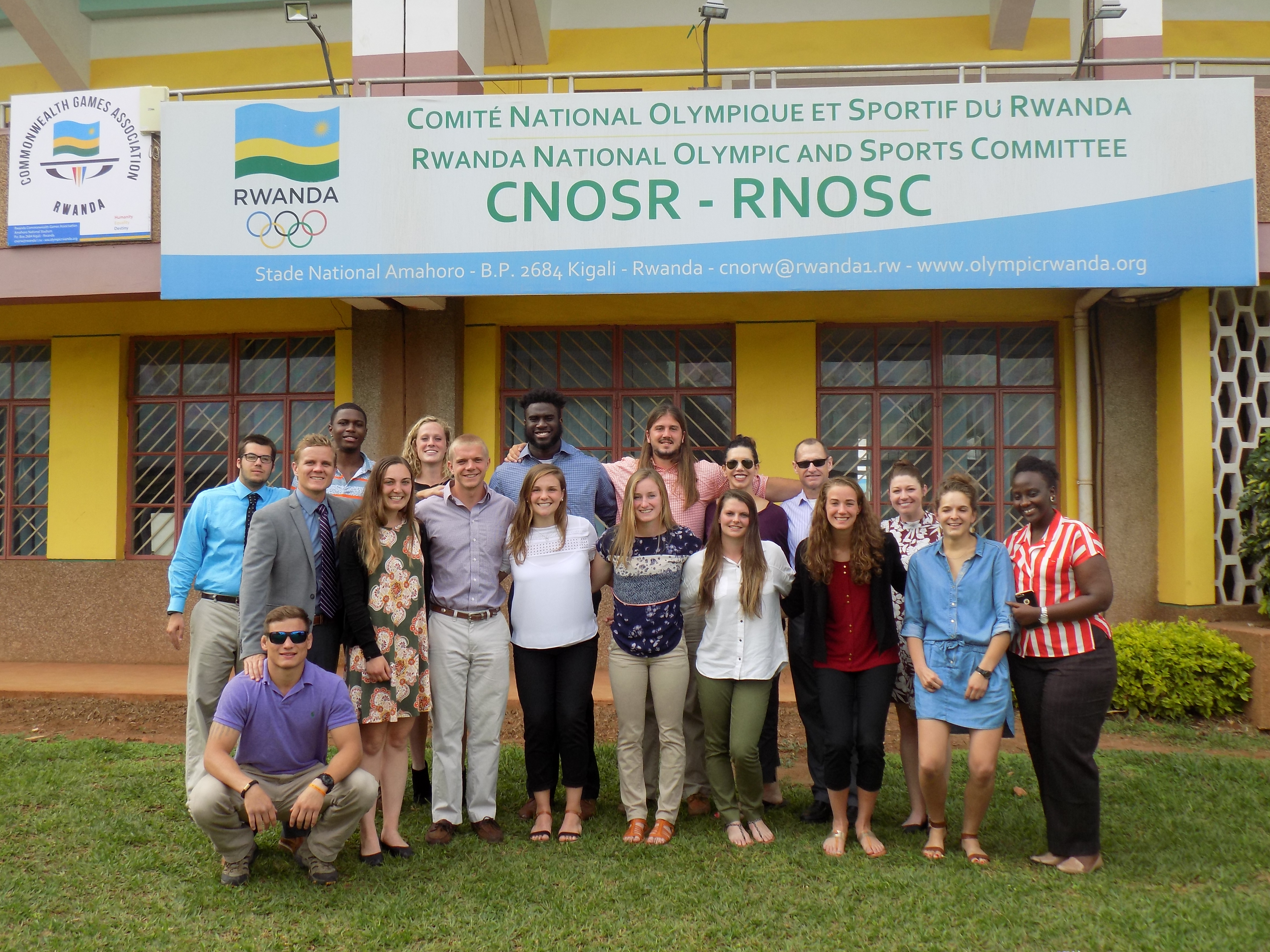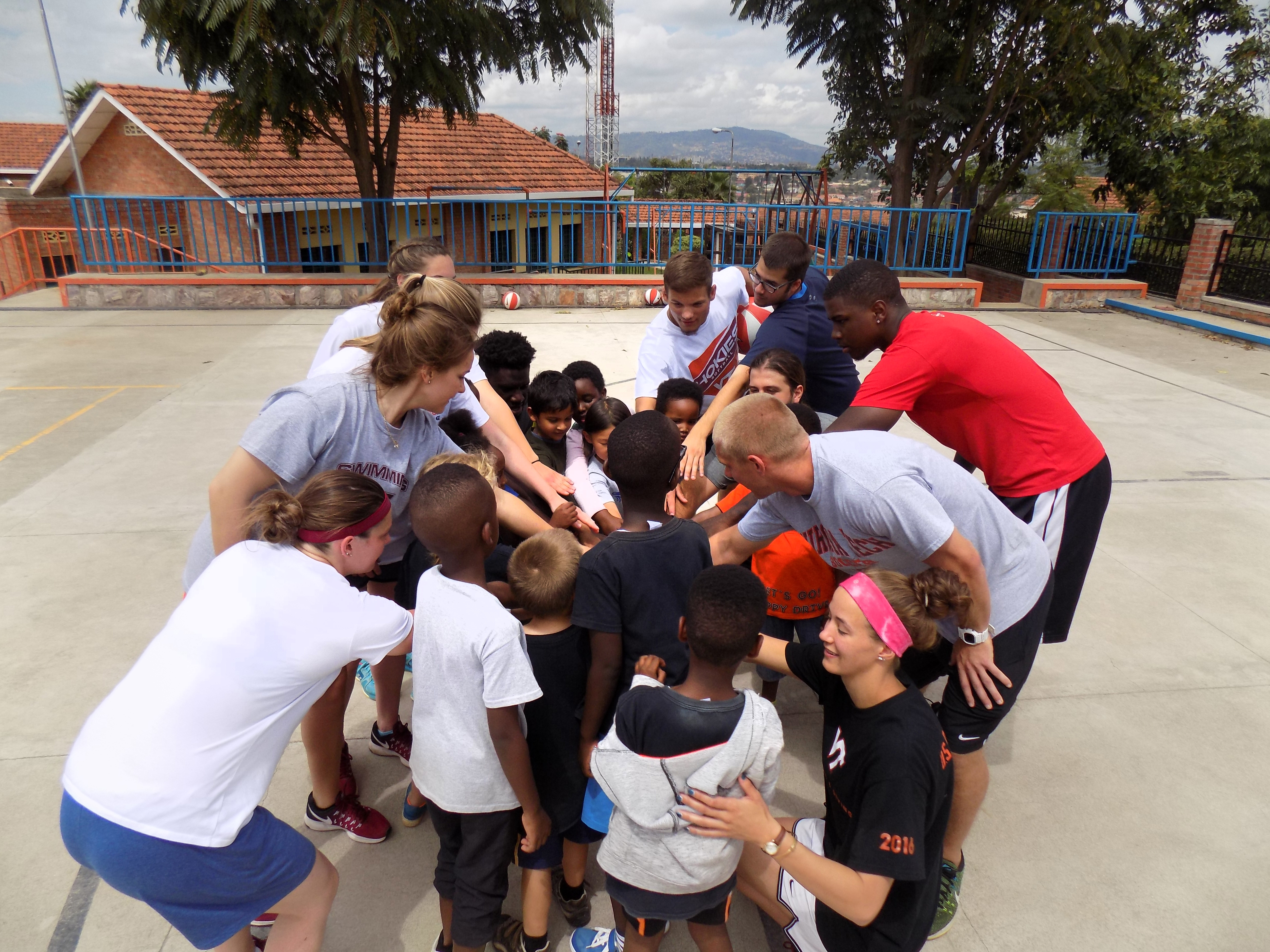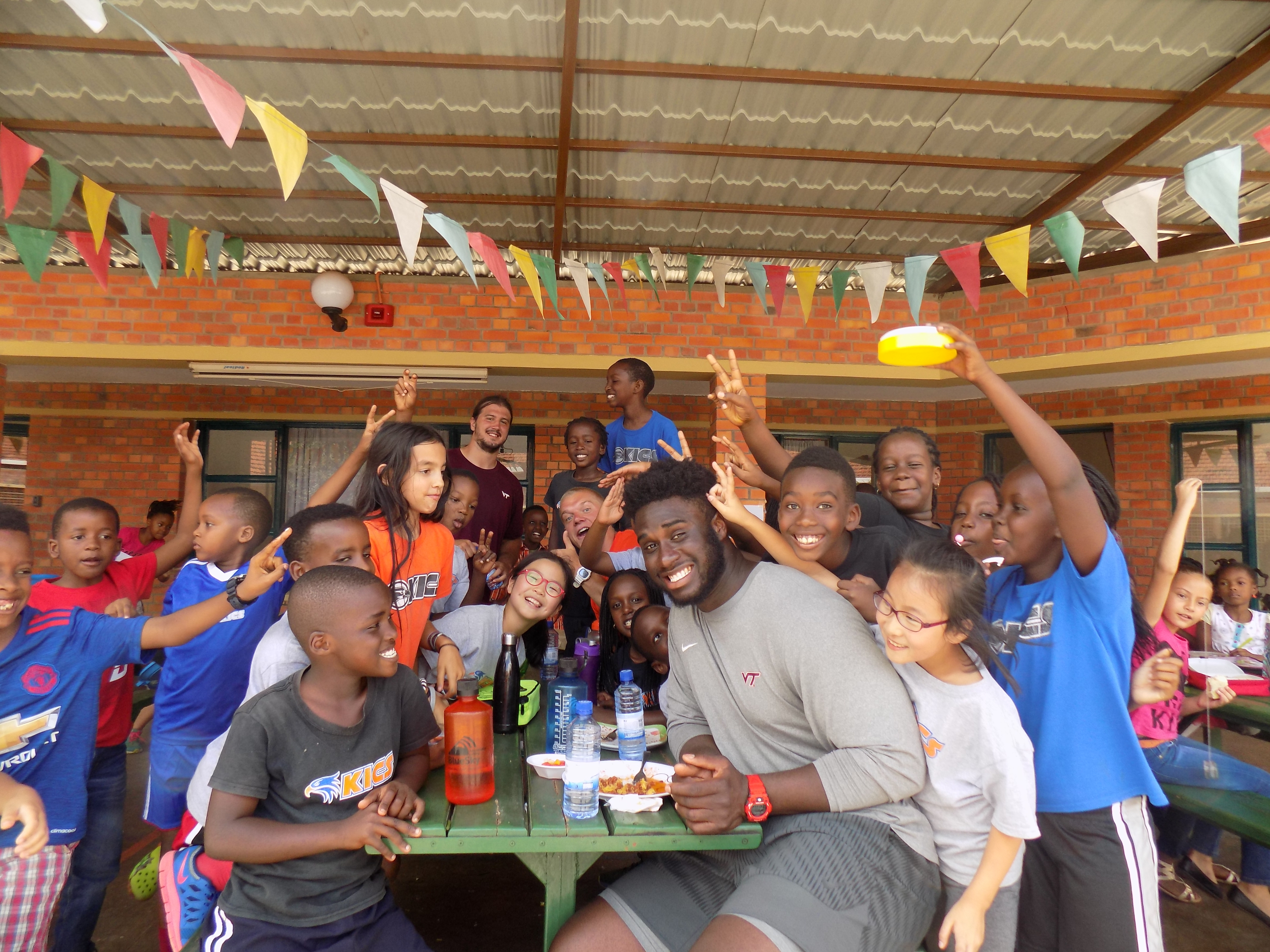Studying abroad in Rwanda an amazing experience for Tech contingent
A group that included several student-athletes went to the African nation earlier this summer and learned how sport helped the country rebuild from tragedy
October 25, 2017
BLACKSBURG – When Sydney Pesetti found out about an opportunity to spend a portion of her summer studying abroad in Rwanda, she expressed an interest and yet admitted that she knew little about the nation.
“I had heard of the country,” the Virginia Tech women’s swimmer said. “That was about it.”
The Glen Allen, Virginia native decided to expand her horizons, and this past May, she enrolled in UAP 3984: Sport, Policy and Society – a study abroad course that explores different sectors of international development and how sport can support such development. Danny White, senior associate AD for student-athlete development, oversaw the course and led a contingent that included Tech student-athletes, students, and athletics department staff members Dr. Gary Bennett (sport psychologist) and Shelby Miller (coordinator of student-athlete development) on a two-week immersion to Rwanda, a small, landlocked country in Central Africa.
This year marked the sixth consecutive one in which White has overseen a course and led Tech students abroad to expose them to other parts of the world and broaden their horizons. In the first four years, he guided groups to the Dominican Republic, where they ran sports camps, visited a local hospital constructed by the Virginia College of Osteopathic Medicine (VCOM), saw the living conditions in one of the poorest sections of the country and more. Last year, he, Dr. Bennett and Miller took a contingent to Switzerland, which serves as the home of the International Olympic Committee and the former United Nations’ Office on Sport for Development and Peace. These people create the policies that use sport as a tool to improve development in under-developed nations.
White used some of his contacts in the profession to help him plan and ultimately take this year’s class to Rwanda – a place where many organizations have used sport to help the nation rebuild following the 1994 genocide there. The experience turned out to be extremely rewarding, and the study abroad course now may have a permanent home.
“I think it went the best of any of the places we’ve gone so far,” White admitted. “The content of the class hasn’t changed, but what was unique about Rwanda was that we got to visit with these organizations using sport for development. In the DR [Dominican Republic], we worked with the Peace Corps or volunteers that were trained by other organizations, but the organizations in Rwanda … this is actually all that they do. Their staff is immersed into this.
“The unique aspect of Rwanda has a great deal to do with its difficult history and context. The social destruction caused by the genocide created this opportunity for the country to grow in new ways. You can see how organizations from the UN to World Vision are plugged into that.”
Nearly all of the Tech students lacked a perspective on Rwanda and its past, but people a little older than them remember the Rwandan genocide – a truly dark mark in world history. In 1994, the radical members of the Hutu tribe oversaw the slaughter of nearly a million members of the Tutsi ethnic group during a 100-day period.
Much of the course’s content centered on this event. The group stayed in Kigali, the nation’s capital, and one of the first stops was the Kigali Genocide Memorial, which honors the people killed during that three-month period in 1994.
Rwanda has bounced back since that horrible time. By many accounts, the nation’s economy continues to grow, but the memorial serves as a reminder – and an educational focal point – of where the country once was.
“I learned about the genocide and how that ties into the culture and where they are now,” football standout Yosuah Nijman said. “I’ve learned how they’ve grown from that, and forgiveness is one of the biggest components in how they’re living now. That was an eye opener to me, and I feel that it’s important to be taught about how people can come together after such a tragedy. Visiting the genocide memorial was one of those rare experiences that really made you think about the past, the present and the future.”
“That [the trip to the memorial] was so hard,” Pesetti said. “In the beginning, you’re like, ‘Wow, this really happened.’ You saw how many people were killed, the kids and the mothers. It was awesome getting to go, and it was good to learn, but it was also humbling. We live in this amazing country, and other countries have had stuff like this happen – and it wasn’t that long ago.”
The group spent most of its time at Kigali International Community School, where the students taught physical education classes to children. They also mixed in a day excursion to Akagera National Park to view wildlife, toured the Rwanda National Olympic Committee offices, and met with a representative of the Rwanda Youth Peace Clubs Organization.
White oversaw a session each day, with the emphasis being on understanding international development and how sport aids in that development. He actually started teaching before they all left for Rwanda, assigning them a book to read called Rwanda, Inc., which tells the story of how a devastated nation rose from a tragedy to become an economic model for under-developed nations. The class then combined books, articles and writing assignments after the students arrived in Rwanda.
“But most of it was hands-on stuff that you can’t read in textbooks,” football player Vinny Mihota said. “It’s the best way to learn, just going over there, and we met with other organizations that were helping to develop the country. It was cool to see their approach as to how they get things done.”
While much of the subject material deals with sport and how it aids in development, the material carries with it an appeal even to those students who aren’t athletes. Emily Mertes, a native of Blacksburg, does not play sports and is in pursuit of a degree not exactly related to sports – agriculture economics. Yet she decided at the last minute to take the course, choosing it as a potential life-changing option over a summer internship.
Outside of a family vacation to the Dominican Republic, the trip marked her first outside of the United States. She came away with a memorable experience.
“Being an agriculture major and environmentally focused, I’m thinking of food and how can we feed people,” she said. “I never thought about the social side and sports and how that would link to it. I think when we’re so focused on one area of development, we don’t see how the others can all work together to be beneficial to everyone. It [the trip] was really eye opening for me.
“There was this whole side of sports and how they were interconnected and linked, and the ways that they used sports and development to change the ways of their country was fascinating to me.”
On their final day in Rwanda, the students oversaw a field day at the international school. They played games with hundreds of kids, leaving a final imprint on those kids before starting their long journey back to the United States.
But the bigger imprint was on the group itself. For many of them, Ut Prosim (“That I May Serve”) became real for the first time.
“It [the class] made me think globally,” Mertes said. “I don’t think locally any more. It’s expanded my dreams and goals and what I want to do. A lot of my classes, the professors have gone all across the world, and I don’t think I would have been as interested if I hadn’t been out of the country this summer. I wouldn’t have seen what I was missing out on, but now I know what it’s like, and I crave it more.
“When you don’t go out of the country and you stay here and study, which is fine, but I don’t think you see what you’re missing out on. It’s easy to become complacent, and think, ‘OK, I’m learning enough here. I’m content with what I’m studying. I’m content with staying in Blacksburg for the next 20 years.’ But when you go somewhere else, it’s like, ‘Wow.’ I feel like my mind has expanded in so many ways, and there are so many options. I think it changed the direction of how I thought.”
Therein lies the goal – to challenge, to expose and to deepen the understanding for those who take this course. Hopefully, these young men and women then feel compelled to make a difference.
And hopefully more follow suit. Approximately 75-plus students have traveled abroad over the past six years. White wants to grow that number and expose them to even more.
The Tech athletics department had made an investment in developing future leaders and world changers. Judging from the reactions of those who took part in the Rwanda experience this year, they’re more than ready to do their part to make the world a better place.For updates on Virginia Tech Athletics, follow the Hokies on Twitter Follow @hokiesports
 Ticket Market Place
Ticket Market Place
 Sports Radio Network |
Sports Radio Network |  Travel Center & Info
Travel Center & Info



